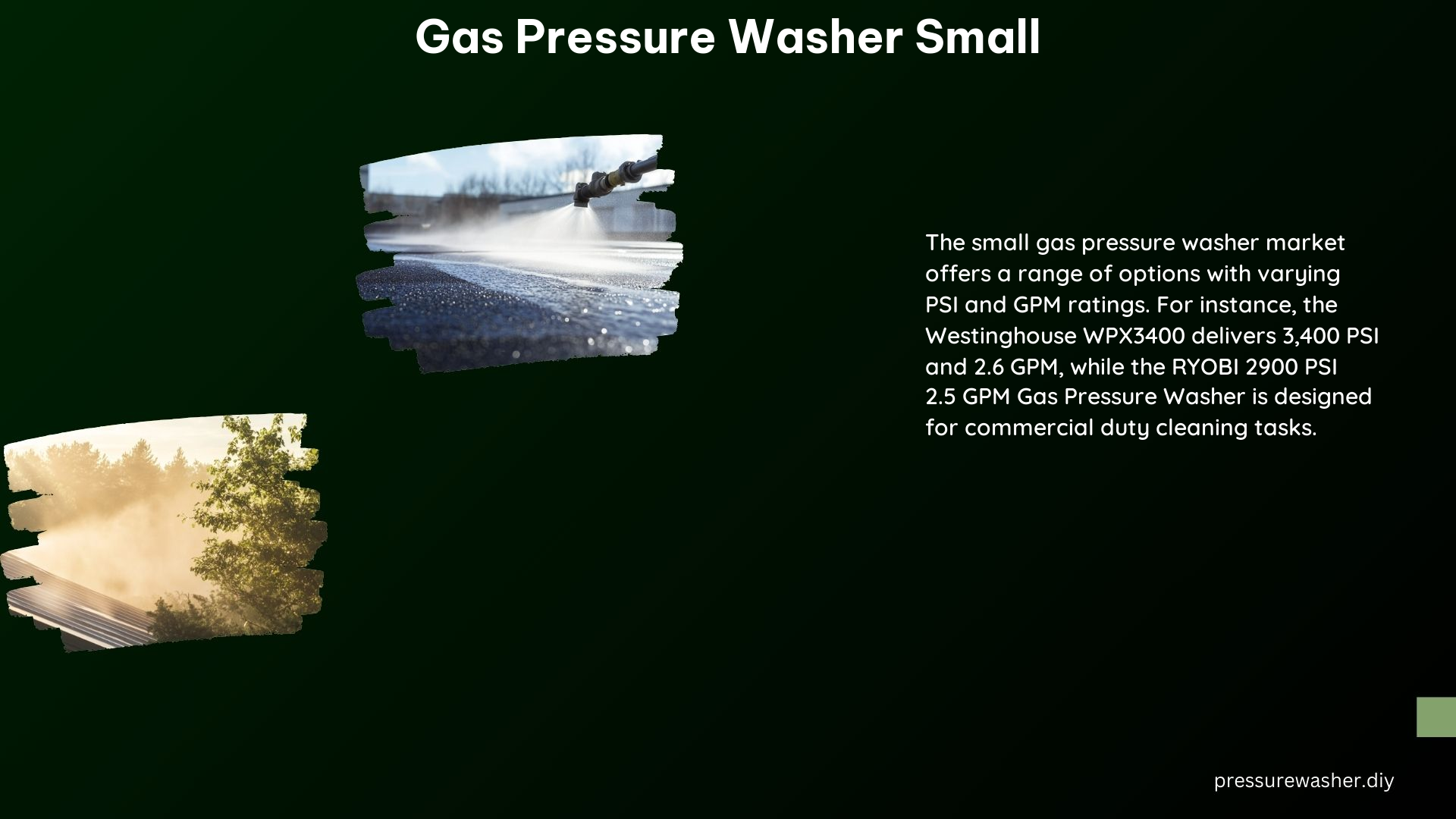Small gas pressure washers are compact, powerful, and versatile cleaning tools that are perfect for residential and light-duty commercial applications. These machines offer a range of features and benefits that make them an essential addition to any homeowner’s or contractor’s arsenal. In this comprehensive guide, we’ll delve into the key features, technical specifications, and troubleshooting tips to help you make an informed decision and get the most out of your small gas pressure washer.
Key Features of Small Gas Pressure Washers
PSI and GPM Ratings
The performance of a small gas pressure washer is primarily determined by its PSI (Pounds per Square Inch) and GPM (Gallons per Minute) ratings. Typically, small gas pressure washers range from 2,000 to 3,400 PSI and 1.2 to 2.6 GPM, providing ample power for a variety of cleaning tasks.
Engine and Pump
Small gas pressure washers often utilize compact, reliable engines like the Honda GX200 or similar models. The pump type can vary, with common designs including axial cam, triplex, and other configurations, depending on the manufacturer and model.
Portability and Weight
One of the key advantages of small gas pressure washers is their lightweight and portable design. These machines typically weigh between 60 to 70 pounds, making them easy to transport and store, even in smaller spaces.
Additional Features
Many small gas pressure washer models come equipped with additional features that enhance their versatility and user-friendliness. These may include soap tanks, multiple nozzle options, adjustable pressure settings, and more.
Benefits of Small Gas Pressure Washers

Compact and Portable
The compact size and lightweight design of small gas pressure washers make them ideal for residential use, as they can be easily maneuvered around the home and stored in tight spaces.
Cost-Effective
Compared to larger commercial-grade pressure washers, small gas models are generally more affordable, making them a cost-effective option for homeowners and small businesses.
Versatility
Small gas pressure washers are suitable for a wide range of cleaning tasks, from washing siding and windows to cleaning vehicles, patio furniture, and other outdoor surfaces.
Troubleshooting Common Issues
Loss of Pressure
If you experience a loss of pressure, there are several potential causes to investigate:
– Check the pump for any blockages or worn-out seals that may be affecting performance.
– Ensure proper engine maintenance, including regular oil changes and spark plug replacements.
– Inspect the hose and nozzles for any kinks, blockages, or damage that could be restricting the flow of water.
Engine Issues
If the engine is not starting or running properly, consider the following:
– Check the fuel level and quality, as stale or contaminated fuel can cause engine problems.
– Ensure the air filter is clean and properly maintained.
– For more complex engine repairs, consult the user manual or contact a professional service technician.
Technical Specifications of Small Gas Pressure Washers
Here are some examples of small gas pressure washers and their technical specifications:
| Model | PSI | GPM | Engine | Weight | Dimensions |
|---|---|---|---|---|---|
| Simpson MegaShot 2800 PSI | 2800 | 2.3 | Honda GX200 | 62 lbs | 24.5 x 20.5 x 18.5 inches |
| Pressure-Pro Eagle II 2700 PSI | 2700 | 2.3 | Honda GX200 | 65 lbs | 24.5 x 20.5 x 18.5 inches |
| Easy-Kleen Commercial 2700 PSI | 2700 | 2.3 | Honda GX200 or Kohler Engine | 65 lbs | 24.5 x 20.5 x 18.5 inches |
References
- The Home Depot – RYOBI 2900 PSI 2.5 GPM Gas Pressure Washer
- Pressure Washers Direct – Consumer Small Gas Pressure Washers
- Amazon – Gas Pressure Washer
- Lowe’s – Gas Pressure Washers
- Walmart – Gas Pressure Washers
